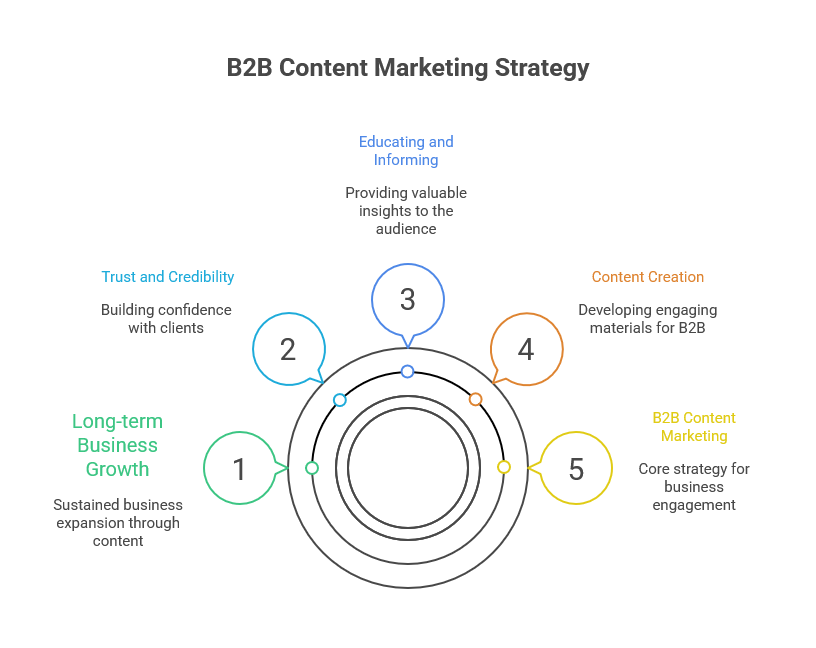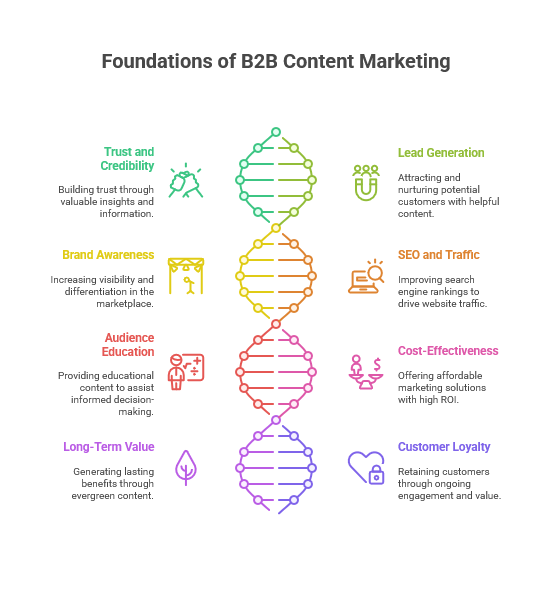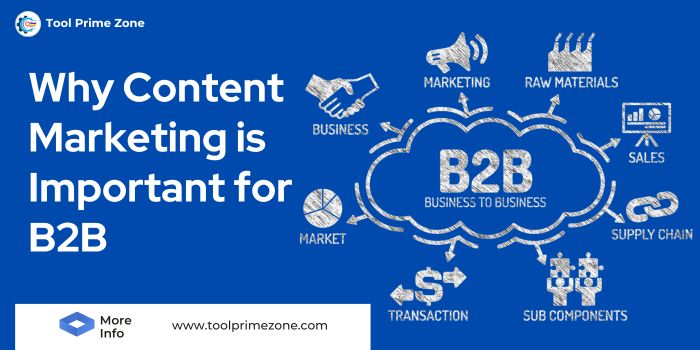In today’s digital world, content marketing has become a key strategy for businesses across industries. For B2B (business-to-business) companies, content marketing can be a game changer. You’re not alone if you’re still questioning why content marketing is essential for B2B. Many businesses still rely on traditional marketing methods, but those tactics are no longer enough to drive growth and engagement in today’s competitive marketplace.
This article will explain the significance of content marketing for B2B companies, share practical tips for implementing it effectively, and highlight why you can’t afford to overlook this powerful marketing tool.
What is Content Marketing for B2B?
Content marketing for B2B refers to creating and sharing valuable, relevant, and consistent content to attract and retain a target audience. Instead of pushing products or services directly, B2B content marketing focuses on educating, informing, and building trust with potential clients. This method fosters relationships that can lead to long-term business growth.
For example, B2B content marketing may include blog posts, videos, case studies, white papers, webinars, and social media content tailored to the needs of business buyers. It allows businesses to position themselves as experts in their field and build credibility with other companies.

Why is Content Marketing Important for B2B?
Now that we understand B2B content marketing let’s explore why it’s crucial for your business.
1. Builds Trust and Credibility
In the B2B world, trust is everything. When companies make decisions that involve significant investments, they want to work with trusted partners. Content marketing helps build that trust by offering valuable insights and information.
According to the Content Marketing Institute, 70% of B2B marketers say content marketing increases engagement and helps establish authority in the market. When you create content that addresses your audience’s pain points, you position your company as a helpful resource, making it more likely that your leads will choose you over competitors.
2. Supports Lead Generation and Nurturing
One of the primary goals of B2B content marketing is to generate and nurture leads. By offering helpful content like eBooks, blog posts, and guides, you can attract potential customers to your website. Once they’re there, you can capture their contact information through lead magnets and begin nurturing them with additional content.
A successful B2B content marketing strategy will guide prospects down the sales funnel by delivering content tailored to their stage in the buying process. Relevant content can move them closer to deciding whether they are at the top of the funnel (seeking general information) or at the bottom (ready to purchase).
3. Increases Brand Awareness
Content marketing helps increase your brand’s visibility. Every blog post, social media post, or video you create is a touchpoint with potential customers. When consistently producing content that resonates with your target audience, you improve your chances of being discovered and remembered.
In a crowded marketplace, standing out is crucial. B2B companies that invest in content marketing often differentiate themselves from competitors. By offering high-quality, relevant content, you can position your brand as an authority in your industry, increasing your chances of gaining long-term customers.
4. Improves SEO and Website Traffic
Search engine optimization (SEO) is another reason why content marketing is essential for B2B. Creating content optimized for search engines increases your chances of appearing in front of potential customers searching for solutions to their business problems. Google loves fresh, valuable content that answers users’ questions, so regularly updating your website with new content improves your chances of ranking higher in search results.
The more content you produce, the more pages there are for search engines to index, ultimately driving more website traffic. This increased traffic can result in more leads and sales, giving your B2B company a measurable ROI from content marketing efforts.
5. Educates Your Audience
Content marketing is also essential because it helps educate your audience. For B2B companies, customers often make complex purchasing decisions that require careful consideration. By providing educational content, you assist your prospects in making informed choices.
When you provide helpful resources, such as how-to articles, tutorials, and industry insights, your audience will be more likely to trust your expertise. This educational content builds authority and nurtures relationships with potential clients by adding value to their business.
6. Cost-Effective Marketing Strategy
Content marketing is more affordable than traditional advertising methods like TV commercials or print ads. Creating a blog post or an informative video can be done at a fraction of the cost of running a traditional advertising campaign. Content marketing requires less investment than paid media campaigns, even with the right tools.
Content marketing is one of the most cost-effective marketing strategies for B2B companies. Its low cost and potential for generating high-quality leads and boosting brand awareness make it a good choice.
7. Provides Long-Term Value
Unlike other marketing efforts that deliver short-term results, content marketing has the potential to provide long-lasting value. A well-written blog post or a helpful guide can generate traffic and leads for months or even years after publication.
As long as your content remains relevant, it can continue to work for you, providing an ongoing stream of leads and customers. This creates compounding returns on your content marketing investment.
8. Fosters Customer Loyalty
Content marketing doesn’t just help you acquire new customers; it also enables you to retain existing ones. You keep your customers engaged with your brand by providing valuable content after the sale. Loyal customers are likelier to refer your business to others, write positive reviews, and make repeat purchases.
Creating content specifically for your current customers—such as product updates, case studies, or tips for maximizing product use—ensures they stay connected with your brand and increases customer retention.

Best Practices for B2B Content Marketing
You must implement a strategy that works to get the most out of your content marketing efforts. Here are some best practices for B2B content marketing:
-
Know Your Audience: To create content that resonates, understand your target audience’s pain points, needs, and interests. This will help you craft relevant and valuable content.
-
Create a Content Calendar: Plan your content and ensure a consistent publishing schedule. This will help you stay organized and keep your audience engaged.
-
Focus on Quality Over Quantity: It’s better to create one high-quality blog post per week than five mediocre ones. Focus on providing value with every piece of content you publish.
-
Repurpose Your Content: Turn your blog posts into videos, infographics, or podcasts. Repurposing content helps you reach a broader audience and maximize your efforts.
-
Measure Your Results: Track key performance metrics such as website traffic, lead generation, and social shares. This will help you understand what works and refine your strategy over time.
FAQs About Content Marketing for B2B
-
Why is content marketing so effective for B2B?
Content marketing educates potential clients, builds trust, and establishes authority, essential in B2B decision-making processes. -
How can content marketing help B2B companies generate leads?
By offering valuable content such as guides or case studies, B2B businesses can attract and nurture leads throughout their buying journey. -
What type of content should B2B companies focus on?
B2B companies should create informative blog posts, case studies, white papers, and how-to guides that address their audience’s challenges. -
How long does it take to see results from content marketing?
Content marketing is a long-term strategy, so it may take several months to see significant results, especially in lead generation and brand awareness. -
Is content marketing affordable for small B2B businesses?
Content marketing is one of the most cost-effective strategies, especially compared to traditional advertising methods.
In a world where digital presence matters more than ever, B2B companies can’t afford to ignore the importance of content marketing. Content marketing is critical in modern business strategies, from building trust to generating leads and increasing brand awareness. By consistently providing valuable, relevant content, B2B businesses can position themselves as industry leaders, attract more customers, and achieve long-term growth.

